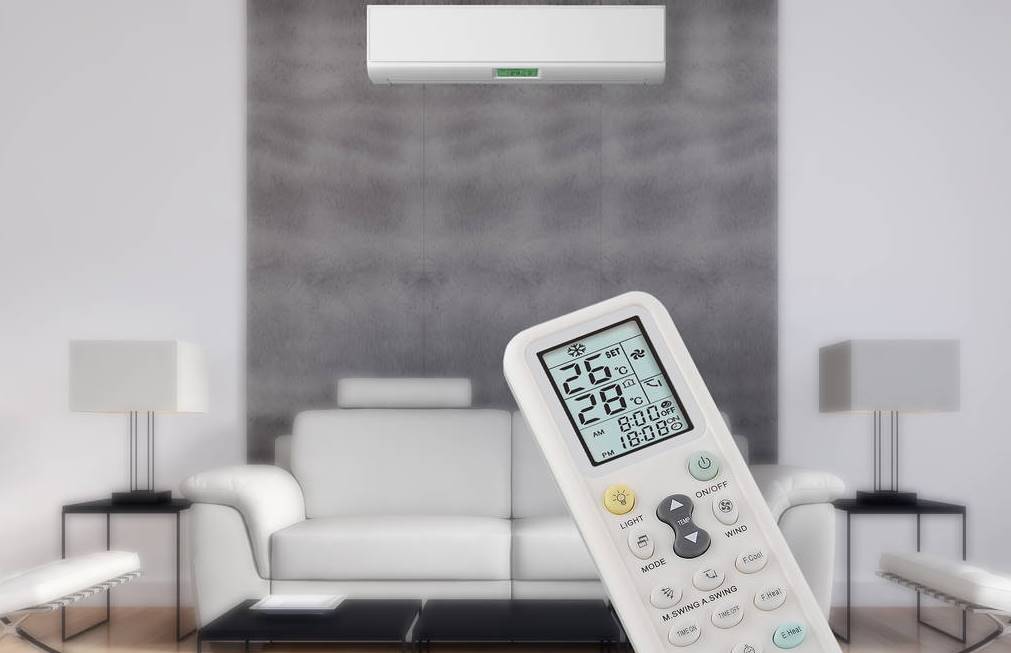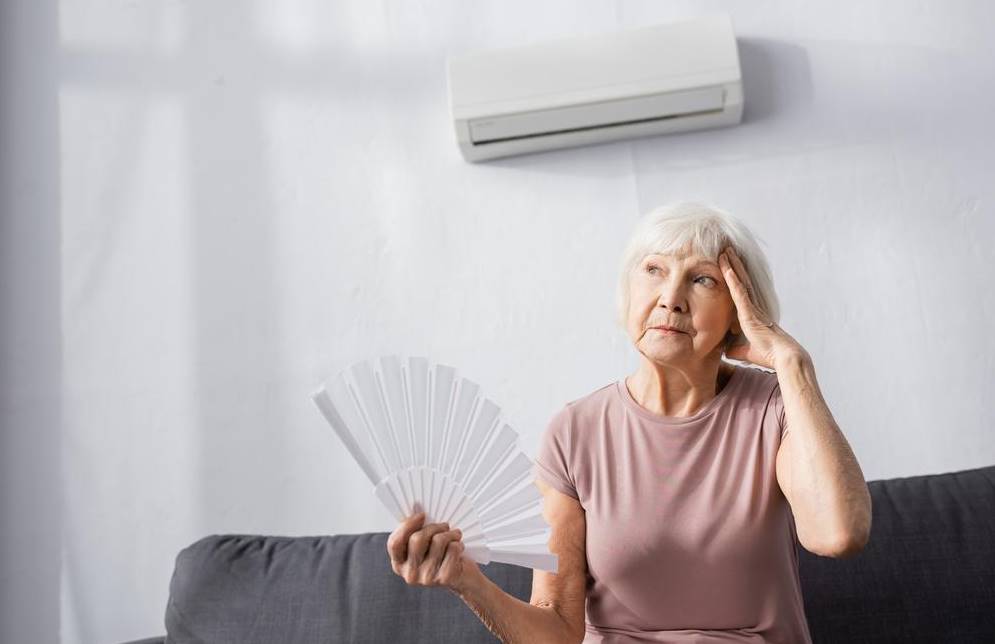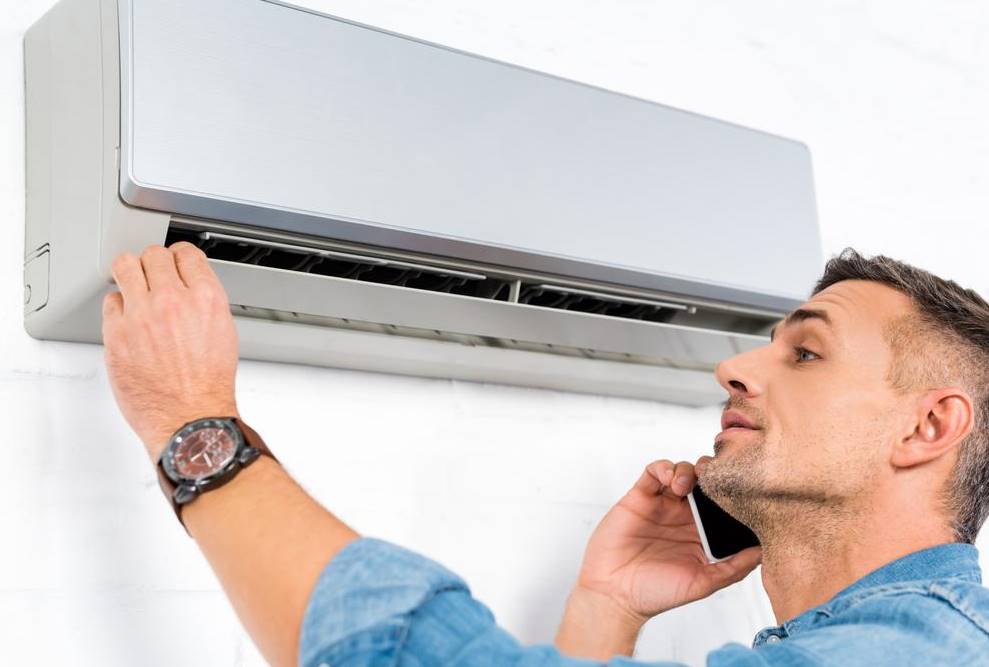Most households depend on their air conditioner, especially in the summer. Air conditioning consumes a large amount of your annual energy costs, but it provides comfort.
Start this blog by learning about your air conditioner's basics to better comprehend it. From there, we'll discuss warning signals that your system may be malfunctioning, helping you spot problems early.
We won't abandon you to deal with the issues. We'll provide you practical ways to boost your air conditioner's performance and save your energy expenditures. We discuss air filter upkeep, temperature settings, leak sealing, and smart thermostats.
We'll also help you set up preventative maintenance and give your outdoor unit the care it needs. In addition, we'll discuss ways to cover windows to keep the inside temperature comfortable. This is your resource for making your air conditioner work smarter, not harder, whether you're a seasoned homeowner or just starting out.
The Basics Of Your Air Conditioner
Learn more about your air conditioner's setup before we begin optimising it. The evaporator, located within, and the condenser, located outside, are its primary components. The air in your home will be cooled thanks to these units working in tandem. Learning their inner workings is the first step to enhancing their efficiency.
Air conditioners may account for 12% of your annual home energy costs and 70% in summer. Climate control uses the most electricity out of any household appliance. Like other property owners, you're undoubtedly looking for ways to cut expenditures without sacrificing comfort with your air conditioner. It's unfortunate, but this may be simpler to say than execute.
Avoid losing hope. You can benefit from the following advice. Read on if you want to know how to make your air conditioner last longer and save money each month.
Warnings That Your System Isn't Running Smoothly
You may be wondering what signs to look for in a decline in productivity. Some of the warning indicators that your system is having this issue are:
Increased Costs
Rising utility bills are a clear indication of air conditioning inefficiency. An inefficient air conditioner uses more power than one that is working properly.
You should get the system checked and cleaned if you see a big increase in your utilisation and prices. The expert can investigate the problem's root and determine what's driving up the prices.
Frequent Cycling
The thermostat is the "brain" of your air conditioning system. It could be time to change the thermostat if you've noticed it turning on and off too frequently. Eventually, regular use and dust will wear down the thermostat's internal mechanism.
The compressor could be another component of your system causing frequent cycling. The best course of action is to have an expert diagnose the problem.
Ice On The Compressor
Ice formation on your air conditioner is a sure sign that it needs serviced. If the coolant line develops a leak, ice can form.
Damaged coils may also cause the problem. A clogged filter may cause this. If there is ice, you know that the efficiency of your unit is lower than it should be.
Unusual Sounds
The noises made by the various home appliances will vary. You've likely grown accustomed to at least some of the noises produced by your unit's typical functioning.
It's best to turn everything off, and schedule maintenance before the problem worsens if something seems off.
Now that you know the warning signals of inefficiency, we can discuss potential solutions.
How To Maximise Your Air Conditioner's Performance
Air Filter Care
The air filter in your air conditioner is the system's unsung hero. You must replace or clean them frequently if you want optimal airflow and better indoor air quality. When the air filter is clogged, it reduces the air conditioner's efficiency.
Pet owners and allergy sufferers should closely check their filters because they may need to be replaced more frequently than normal. It could be as simple as a filthy filter preventing your air conditioner from functioning properly.
How Often Should I Swap Out My Air Filters?
Effective air conditioning starts with regular air filter checks and replacement. Every six months, clean or replace the filter on your air conditioning system or ductwork, depending on which you have. For optimal performance, always use clean, debris-free, high-quality filters. This can be ensured by wiping the old filter with a dry cloth and keeping it away from moisture.
The first line of defence against dirt and dust in your home is an air filter. Even though they can catch particles as fine as 0.3 microns, they must be replaced regularly to function properly. By installing a new filter instead of a dirty one, you can reduce your air conditioner's power consumption by 5-15 per cent.
The Importance Of Frequent Cleaning
Try to breathe through a congested nose, and that's how your air conditioner will feel if the filters and coils are unclean. Maintaining a clean working environment is crucial. Every one to three months, clean or replace the air filters and the coils of any dirt. A clean system uses less energy while increasing productivity.
The Optimal Temperature
Saving money on energy costs is as simple as maintaining a comfortable temperature at home. In the summer, you should keep the temperature at 78 degrees Fahrenheit (25 degrees Celsius) at home and a few degrees higher when you're out and about. Increasing the temperature by one degree can cut energy use by up to three per cent.
In addition, an Energy Star-certified air conditioner could be a wise investment if you use it regularly or exclusively during the warm summer months. These systems are as effective at cooling a room as their non-certified counterparts while using up to 10% less electricity.
Seal The Leaks
There could be microscopic fractures and openings in your home that let chilly air escape if you want to keep the cool air where it belongs: inside, caulk, or weatherstrip these cracks. Comfort levels and energy costs should improve.
Remember To Keep Vents Clear And Clean
Reduced cooling effectiveness and increased indoor discomfort are the results of blocking vents. Avoid obstructing air vents with furniture, blinds, or toys by cleaning or vacuuming them frequently. Establish a regular pattern where you inspect each vent as you walk around the house.
The Impact Of Smart Thermostats
Replace your old thermostat with a smart one for superior management and cost savings. The temperature will be set based on your preferences, which the gadget will learn. They are also smartphone-operable for further convenience. It's like putting a leash on your air conditioner.
A smart thermostat or air conditioner controller can reduce your utility costs. Thermostats are electronic devices used to regulate indoor temperatures. Many thermostats today may be controlled from afar, programmed ahead of time, and even enclosed within a virtual geographic boundary.
Smart Thermostats
The use of a smartphone or tablet to regulate the temperature in your home is a relatively recent innovation made possible by smart thermostats. Occupancy sensors (auto off/on when no one is home), humidity sensors, Wi-Fi connectivity (can be programmed from anywhere), and geofencing capabilities (auto on at certain times/days) are just a few of the functions they offer.
Programmable Thermostats
Each time the user or technician wishes to change the thermostat's settings, such as heating/cooling modes, heating days/cooling days, etc., the thermostat must be manually programmed. These may be considered "old school" technology now. Still, they continue to be popular among homeowners since they allow for greater management of one's living space than simply turning on and off appliances with the flick of a switch and a little more thought than is required to set an alarm clock.
Separate Your Thermostat From Any Potential Heat Sources.
Where you put your thermostat significantly impacts how well your air conditioner performs as a whole. Inaccurate readings can occur if the thermostat is placed in a hot spot of the house, such as near a lamp, sunny window, or appliance.
Because of this, a trained HVAC professional will never install a thermostat in direct sunlight. If your machine is old and broken, it may be worth fixing.
This is because a thermostat installed in such a place will "think" it needs to provide more room cooling than is necessary. In the long run, this will increase the cost of cooling your home and the strain on your air conditioner.
Establish Preventative Maintenance Routines
Setting up routine preventative maintenance appointments with a qualified HVAC expert is one of the most beneficial things you can do to improve the energy efficiency of your air conditioning system. They will check to ensure everything runs smoothly and operates as it should.
Please Maintain A Tidy Outdoor Unit
The appliance in the garden needs TLC, too. Remove any litter, such as leaves or twigs, and keep it tidy. If you keep the outdoor unit clean, it will be better able to dissipate heat and keep your system from overheating on hot days.
When Should I Clear Out My Drain Line?
A drain is near the system's indoor cooling coil. If your home has a basement, this is situated over the furnace.
If you pour a cup of chlorine bleach down the air conditioner's drain and then flush it with water, the drain should stay clear all summer.
Water-related problems can be prevented if the drain pipe is regularly cleaned. Air conditioners often break down due to clogged drain pipes.
Keep mulch and soil away from the exterior drain lines of your house. A shop vac will do the trick for removing them.
It would help if you Covered The Windows.
To avoid sun heating, close shutters or drapes.
If you're attempting to maximise your system's efficiency, this is a huge help.
The heat entering a residence can be decreased by covering the windows. In this way, unnecessary strain is avoided on your computer.
When you go to work in the morning, shutting the curtains and blinds is a good idea. This helps keep the house cool in summer.
When you return home, you can let the late afternoon sun in by opening them. This way, you can keep the temperature inside your home more comfortable.
Despite Cleaning, Why Isn't My Air Conditioner Working Properly?
Possible causes include insufficient refrigerant or a broken compressor. Get in touch with an expert technician to investigate and resolve the problem.
Enjoy Your Cool Haven.
It doesn't take a rocket scientist to determine how to get the most out of your air conditioner. You may be able to keep your house comfortably cool and save money by making energy-efficient decisions and performing routine maintenance.
Go ahead and put your newfound understanding of how to get the most out of your air conditioner to good use. When the sweltering summer days arrive, you'll be relieved to retreat to your cool sanctuary. Be calm!
Using the many strategies presented here, you can save money on air conditioning bills. The most crucial step is to monitor your energy consumption and make changes as needed.
Conclusion
This blog covers air conditioning basics and malfunction warning signs to optimise performance. The air conditioner's evaporator and condenser cool your home. Household air conditioners cost 12% of annual energy and 70% in summer. To optimise performance, understand the system's setup, spot inefficiencies, and schedule preventative maintenance.
System inefficiency is indicated by higher expenses, frequent thermostat or compressor cycling, compressor ice accumulation, and strange noises. Airflow and interior air quality depend on air filter maintenance. Pet owners and allergy sufferers should check their filters often since they may need to be replaced more often.
Effective air conditioning requires regular air filter examinations and replacement. Use clean, debris-free, high-quality filters and replace them every six months to save 5-15% on power. Unclean filters and coils create stuffy nostrils and reduce energy utilisation, so clean them often.
Home comfort is key to energy savings. Keep the temperature at 78 degrees Fahrenheit (25 degrees Celsius) at home and a few degrees higher outside in summer. Energy Star-certified air conditioners chill rooms as well as non-certified ones while using 10% less electricity.
Seal leaks, clean vents, and install smart thermostats to boost air conditioner performance. Smart thermostats can be programmed, operated remotely, and encased in a virtual geographic border. They have Wi-Fi, geofencing, occupancy, and humidity sensors.
Changing settings on programmable thermostats requires manual programming, but they improve space management. To minimise erroneous readings and higher cooling costs, keep your thermostat away from heat sources like lamps, sunny windows, and appliances.
Schedule preventative maintenance with a skilled HVAC specialist to maintain smooth functioning. Maintain an organised outside unit and clean drain lines near the indoor cooling coil. Remove mulch and soil from external drain lines with a shop vac.
Close windows to decrease heat gain and sun heating. Shut curtains and blinds before work and open them when you get home to keep it cool.
Your air conditioner may be faulty owing to insufficient refrigerant or a broken compressor. An skilled technician can investigate and fix the issue. These tips will lower your air conditioning expenditures and keep your home cool throughout summer.
Content Summary
- Air conditioning is a necessity in most homes, but it also accounts for a sizable chunk of the annual energy bill.
- To get the most out of your air conditioner, you need to know the essentials.
- Study the role of the evaporator and the condenser.
- In the summer, air conditioning can make up as much as 70% of the energy bill for a typical home.
- Learn to identify the symptoms of a failing system.
- Air conditioning inefficiency is reflected in rising electricity costs.
- If the system cycles on and off frequently, check the thermostat and the compressor.
- When ice forms on the compressor or coolant line, you know there's something wrong.
- If your air conditioner is making strange noises, you should not disregard them.
- Some easy-to-implement strategies are outlined for maximising your air conditioner's efficiency and reducing your utility bills.
- Air filters should be regularly cleaned to ensure proper airflow and quality inside the building.
- Air filters should be changed at varying intervals; those with pets or allergies should do so more frequently.
- Air filters should be cleaned or replaced at least once every six months.
- Keeping things clean and tidy on a regular basis is crucial.
- For maximum energy savings, set the thermostat at about 78 degrees Fahrenheit (25 degrees Celsius).
- An air conditioner with the Energy Star label will cool your home effectively while consuming less power.
- To keep the cool air inside your house, seal all the cracks and crevices you can find.
- Maintaining unobstructed and clean air vents will maximise cooling efficiency.
- If you want more manageability and savings, a smart thermostat is a worthwhile investment.
- Features like remote access and geofencing are available on some smart thermostat models.
- For efficient temperature regulation, proper thermostat location is essential.
- The expense of cooling a home might rise if the thermostat is placed incorrectly.
- Work with a professional HVAC technician to set up regular preventative maintenance.
- Maintaining a clean outdoor unit will keep it from overheating.
- Clean the outdoor unit of any debris, such as leaves or twigs.
- In order to avoid costly repairs caused by water damage, it is important to regularly clear the drain line.
- Keep soil and mulch away from outdoor drains.
- Close the blinds or shutters to keep the cool air inside.
- When windows are covered, less work is done by the air conditioner.
- Closing and opening drapes and blinds at different times of day can help regulate the temperature in a room.
- If your air conditioner still isn't cooling effectively after you've cleaned it, there may be a problem with the refrigerant or the compressor.
- Get in touch with a qualified specialist for assistance.
- Use the advice given to lower your monthly cooling costs.
- Keep an eye on how much power you're using so you can make adjustments.
- To keep your home cool and pleasant, you should use energy-saving methods.
- Make a cool haven for yourself to retreat to on hot summer days.
- Put what you've learned here to good use when choosing an HVAC system.
- Enjoy the benefits of a well-maintained air conditioner to the fullest extent possible.
- If you want to save money and energy, just follow the advice given.
- For optimal comfort in your house, tune up your air conditioner so that it works smarter, not harder.
Frequently Asked Questions About a
It's generally recommended to clean or replace air filters every six months. However, if you have pets or allergies, you should do it more frequently, such as every three months. Clean filters ensure optimal airflow and energy efficiency.
Setting your thermostat to around 78°F (25°C) at home is a good starting point during the summer. You can increase the temperature a few degrees when you're away to save on energy consumption and costs.
Yes, smart thermostats can be a wise investment. They offer features like remote control and learning your preferences to optimise cooling. They can help you save on energy bills and conveniently control your HVAC system.
Watch for signs of inefficiency, such as increased utility bills, frequent cycling, ice formation on the compressor, or unusual sounds. If you notice any of these issues, it's advisable to contact a professional HVAC technician for a thorough inspection and necessary repairs.
To seal leaks effectively, you can use caulk or weatherstripping to close any gaps or cracks around doors, windows, and other openings. Proper insulation in your home's walls and attic can also help maintain a comfortable indoor temperature and reduce energy consumption.



